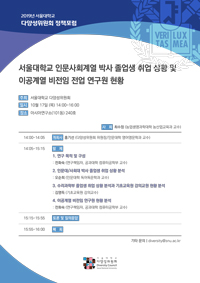Forum: Career Path Analysis and Supporting Policy for Non-Tenure Track Faculty and Researchers at SNU
19-10-26 16:54페이지 정보
작성자 관리자 작성일19-10-26 16:54 조회480회 댓글0건첨부파일
-
 2-9_서울대 인문사회계열 박사 졸업생 취업 상황 및 이공계열 비전임 연구원 현황 포럼 자료집.pdf
(6.4M)
72회 다운로드
DATE : 2020-04-03 14:07:49
2-9_서울대 인문사회계열 박사 졸업생 취업 상황 및 이공계열 비전임 연구원 현황 포럼 자료집.pdf
(6.4M)
72회 다운로드
DATE : 2020-04-03 14:07:49
관련링크
본문
 The research team behind the Diversity Council’s research project for the first half of 2019, “Career Path Analysis and Supporting Policy for Non-Tenure Track Faculty and Researchers at SNU” (lead researcher: Professor Wha Sook Jeon, Dept. of Computer Science and Engineering), presented its results at a policy forum on October 17th at 2 P.M. in Room 240 of the Asia Center. The team discussed how its study, which began in May, analyzed information collected through several channels, including departmental offices, about the employment situation of recent graduates of doctoral programs in the humanities and social sciences, as well as the situations of researchers working at research institutes for the natural sciences and engineering. Because the study focused on the colleges to which members of the research team belong, the College of Education, arts- or sports-related departments, and the College of Human Ecology were not included in its scope. However, it did include a survey of the teaching professors working for the Faculty of Liberal Education, the organization in charge of SNU’s general education courses.
The research team behind the Diversity Council’s research project for the first half of 2019, “Career Path Analysis and Supporting Policy for Non-Tenure Track Faculty and Researchers at SNU” (lead researcher: Professor Wha Sook Jeon, Dept. of Computer Science and Engineering), presented its results at a policy forum on October 17th at 2 P.M. in Room 240 of the Asia Center. The team discussed how its study, which began in May, analyzed information collected through several channels, including departmental offices, about the employment situation of recent graduates of doctoral programs in the humanities and social sciences, as well as the situations of researchers working at research institutes for the natural sciences and engineering. Because the study focused on the colleges to which members of the research team belong, the College of Education, arts- or sports-related departments, and the College of Human Ecology were not included in its scope. However, it did include a survey of the teaching professors working for the Faculty of Liberal Education, the organization in charge of SNU’s general education courses.
After Diversity Council chair Ki-Sun Hong explained the meaning of the study in her opening remarks, lead researcher Professor Wha Sook Jeon briefly outlined its goals, scope, and method. Next, Professor SoonHee Oh (Dept. of German Language and Literature) used data about people who received doctoral degrees in the humanities or social sciences between 2011 and 2015 to analyze the number of graduates in each major, the time it took them to earn their degree, and their current employment situation. Professor Young Deuk Kim (Faculty of Liberal Education) divided the Department of Mathematical Sciences graduates into pure mathematics majors and applied mathematics majors and examined the employment situation of each group, and then presented on the situation and results of a survey of teaching professors at the Faculty of Liberal Education. Professor Jeon then took the podium again to discuss in detail the situations of researchers in the natural sciences, engineering, medicine, agriculture, and similar fields. As she ended her presentation, she emphasized the importance of keeping the difference between the humanities/social sciences and the natural sciences/engineering in mind and gaining a clear understanding of the situations in each area. During the question-and-answer period, attendees asked about differences in the qualifications required for being hired as tenure-track personnel in each area and differences in each area’s preference for those who had earned their doctorate at a domestic university versus abroad, and one commented that future research should compare SNU with provincial Flagship National Korean Universities on factors such as the number of doctorate degrees awarded and the employment situation of doctoral graduates.
댓글목록
등록된 댓글이 없습니다.
